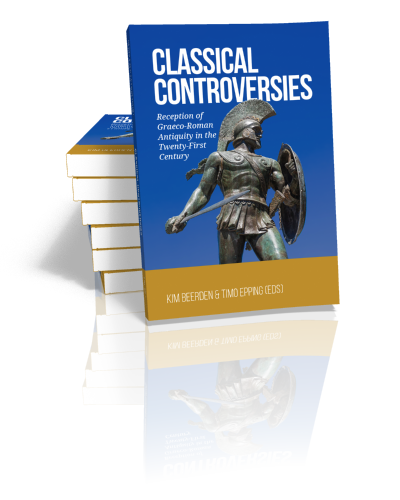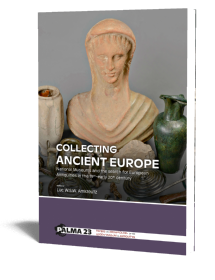Abstract:
Modern receptions of Graeco-Roman Antiquity are important ideological markers of the ways we envisage our own twenty-first-century societies. An urgent topic of study is: what kinds of narratives – sometimes controversial – about Antiquity do people create for themselves at this moment in time, and for what reasons? This volume aims to showcase a number of illustrative examples, and thus to provide a deeper understanding of twenty-first-century reception of Antiquity.
After a general introduction in Part I, the volume focuses on two main fields: controversies referencing ancient and modern literary works; and controversies surrounding heritage ethics.
Part II takes literary evidence from the USA to Italy as its starting point: it shows how metaphors about early Christianity find their way into American conservative discourse; how Sparta is evoked in right-wing thinking in the USA, Germany, France and Scandinavia; and how Aeneas plays a role in recent Italian debates on migrations. The last paper discusses the depiction of classicists in modern novels.
Part III focuses on heritage ethics and material culture, in first instance taking practices at the Dutch National Museum of Antiquities (Rijksmuseum van Oudheden) – on the display of death, queering and orientalism – as case studies. The last paper delves into the history of the Via Belgica to show how antiquity has been weaponised for political aims for many centuries.
Together, these papers show that academics should engage with the receptions of antiquity in the recent past and present. If they want their research and museum displays to be part of current reception, they should make their voice heard.
About the Editors
Kim Beerden is a lecturer in Ancient History at Leiden University, The Netherlands. She has published in the field of ancient divination, see her monograph Worlds full of signs: ancient Greek divination in context (Brill, Leiden: 2013; paperback 2021).
Timo Epping is a museum educator at the National Museum of Antiquities (Leiden, The Netherlands). He has published several articles in journals for history teachers and museum education.
Contents
Part I: Introduction
Preface
Kim Beerden
1. Introduction: Stop the Steal!
Frederick G. Naerebout
Part II: Controversies and Literary Traditions
2. Whose persecution? Early Christianity as a Metaphor in Contemporary American Political Discourse
K.P.S. (Renske) Janssen
3. Spartans on the Capitol: Recent Far-Right Appropriations of Spartan Militarism in the USA and their Historical Roots
Stephen Hodkinson
4. Leonidas Goes North: Swedish Appropriations of Sparta and the Battle of Thermopylae and their Wider European Context
Johannes Siapkas and Thomas Sjösvärd
5. Pop Culture against Modernity: New Right-Wing Movements and the Reception of Sparta
Julia Müller
6. Fato Profugus. Aeneas the Refugee: an Italian Debate
Marco Gay
7. The Classicist as a Literary Character in Contemporary Literature: the Depiction of a Discipline
Barbara Holler
Part III: Controversies and Heritage Ethics
8. Ancient Death and the Contemporary World: the Role of Graeco-Roman Death in Museum Display
Patricia Kret
9. Queering the National Museum of Antiquities
Suus van den Berg
10. Dummie de Mummie: an Egyptian Body as the Undead, Oriental Other
Daniel Soliman
11. Who Owns the Road to the Roman Past? The Case of the Via Vipsania aka the chaussée romaine, the Römerstrasse, the Romeinse kassei, aka the Via Belgica
Liesbeth Claes











